- Home
- Shirley Jackson
We Have Always Lived in the Castle Page 8
We Have Always Lived in the Castle Read online
Page 8
It had been a long time since any of them came, but I had not forgotten how they made me feel. At first, they were always there, waiting for Constance, just wanting to see her. “Look,” they said, nudging each other and pointing, “there she is, that one, that’s the one, Constance.” “Doesn’t look like a murderess, does she?” they told each other; “listen, see if you can get a picture of her when she shows again.” “Let’s just take some of these flowers,” they said comfortably to each other; “get a rock or something out of the garden, we can take it home to show the kids.”
“Constance?” he said outside. “Constance?” He knocked again. “I want to talk to Constance,” he said, “I have something important to say to her.”
They always had something important they wanted to tell Constance, whether they were pushing at the door or yelling outside or calling on the telephone or writing the terrible terrible letters. Sometimes they wanted Julian Blackwood, but they never asked for me. I had been sent to bed without my supper, I had not been allowed in the courtroom, no one had taken my picture. While they were looking at Constance in the courtroom I had been lying on the cot at the orphanage, staring at the ceiling, wishing they were all dead, waiting for Constance to come and take me home.
“Constance, can you hear me?” he called outside. “Please listen for just a minute.”
I wondered if he could hear me breathing on the inside of the door; I knew what he would do next. First he would back away from the house, sheltering his eyes from the rain, and look up at the windows upstairs, hoping to see a face looking down. Then he would start toward the side of the house, following the walk which was only supposed to be used by Constance and me. When he found the side door, which we never opened, he would knock there, calling Constance. Sometimes they went away when no one answered at either the front door or the side; the ones who were faintly embarrassed at being here at all and wished they had not bothered to come in the first place because there was really nothing to see and they could have saved their time or gone somewhere else—they usually hurried off when they found they were not going to get in to see Constance, but the stubborn ones, the ones I wished would die and lie there dead on the driveway, went around and around the house, trying every door and tapping on the windows. “We got a right to see her,” they used to shout, “she killed all those people, didn’t she?” They drove cars up to the steps and parked there. Most of them locked their cars carefully, making sure all the windows were shut, before they came to pound at the house and call to Constance. They had picnics on the lawn and took pictures of each other standing in front of the house and let their dogs run in the garden. They wrote their names on the walls and on the front door.
“Look,” he said outside, “you’ve got to let me in.”
I heard him go down the steps and knew he was looking up. The windows were all locked. The side door was locked. I knew better than to try to look out through the narrow glass panels on either side of the door; they always noticed even the slightest movement, and if I had even barely touched the dining-room drapes he would have been running at the house, shouting, “There she is, there she is.” I leaned against the front door and thought about opening it and finding him dead on the driveway.
He was looking up at a blank face of a house looking down because we always kept the shades drawn on the upstairs windows; he would get no answer there and I had to find Constance a sweater before she shivered any more. It was safe to go upstairs, but I wanted to be back with Constance while he was waiting outside, so I ran up the stairs and snatched a sweater from the chair in Constance’s room and ran downstairs and down the hall into the kitchen and he was sitting at the table in my chair.
“I had three magic words,” I said, holding the sweater. “Their names were MELODY GLOUCESTER PEGASUS, and we were safe until they were said out loud.”
“Merricat,” Constance said; she turned and looked at me, smiling. “It’s our cousin, our cousin Charles Blackwood. I knew him at once; he looks like Father.”
“Well, Mary,” he said. He stood up; he was taller now that he was inside, bigger and bigger as he came closer to me. “Got a kiss for your cousin Charles?”
Behind him the kitchen door was open wide; he was the first one who had ever gotten inside and Constance had let him in. Constance stood up; she knew better than to touch me but she said “Merricat, Merricat” gently and held out her arms to me. I was held tight, wound round with wire, I couldn’t breathe, and I had to run. I threw the sweater on the floor and went out the door and down to the creek where I always went. Jonas found me after a while and we lay there together, protected from the rain by the trees crowding overhead, dim and rich in the kind of knowing, possessive way trees have of pressing closer. I looked back at the trees and listened to the soft sound of the water. There was no cousin, no Charles Blackwood, no intruder inside. It was because the book had fallen from the tree; I had neglected to replace it at once and our wall of safety had cracked. Tomorrow I would find some powerful thing and nail it to the tree. I fell asleep listening to Jonas, just as the shadows were coming down. Sometime during the night Jonas left me to go hunting, and I woke a little when he came back, pressing against me to get warm. “Jonas,” I said, and he purred comfortably. When I woke up the early morning mists were wandering lightly along the creek, curling around my face and touching me. I lay there laughing, feeling the almost imaginary brush of the mist across my eyes, and looking up into the trees.
5
When I came into the kitchen, still trailing mist from the creek, Constance was arranging Uncle Julian’s breakfast tray. Uncle Julian was clearly feeling well this morning, since Constance was giving him tea instead of hot milk; he must have awakened early and asked for tea. I went to her and put my arms around her and she turned and hugged me.
“Good morning, my Merricat,” she said.
“Good morning, my Constance. Is Uncle Julian better today?”
“Much, much better. And the sun is going to shine after yesterday’s rain. And I am going to make a chocolate mousse for your dinner, my Merricat.”
“I love you, Constance.”
“And I love you. Now what will you have for breakfast?”
“Pancakes. Little tiny hot ones. And two fried eggs. Today my winged horse is coming and I am carrying you off to the moon and on the moon we will eat rose petals.”
“Some rose petals are poisonous.”
“Not on the moon. Is it true that you can plant a leaf?”
“Some leaves. Furred leaves. You can put them in water and they grow roots and then you plant them and they grow into a plant. The kind of a plant they were when they started, of course, not just any plant.”
“I’m sorry about that. Good morning, Jonas. You are a furred leaf, I think.”
“Silly Merricat.”
“I like a leaf that grows into a different plant. All furry.”
Constance was laughing. “Uncle Julian will never get his breakfast if I listen to you,” she said. She took up the tray and went into Uncle Julian’s room. “Hot tea coming,” she said.
“Constance, my dear. A glorious morning, I think. A splendid day to work.”
“And to sit in the sun.”
Jonas sat in the sunlit doorway, washing his face. I was hungry; perhaps it would be kind to Uncle Julian today if I put a feather on the lawn at the spot where Uncle Julian’s chair would go; I was not allowed to bury things in the lawn. On the moon we wore feathers in our hair, and rubies on our hands. On the moon we had gold spoons.
“Perhaps today is a good day to begin a new chapter. Constance?”
“Yes, Uncle Julian?”
“Do you think I should begin chapter forty-four today?”
“Of course.”
“Some of the early pages need a little brushing up. A work like this is never done.”
“Shall I brush your hair?”
“I think I will brush it myself this morning, thank you. A man’s head should be his own r
esponsibility, after all. I have no jam.”
“Shall I get you some?”
“No, because I see that I have somehow eaten all my toast. I fancy a broiled liver for my lunch, Constance.”
“You shall have it. Shall I take your tray?”
“Yes, thank you. And I will brush my hair.”
Constance came back into the kitchen and set down the tray. “And now for you, my Merricat,” she said.
“And Jonas.”
“Jonas had his breakfast long ago.”
“Will you plant a leaf for me?”
“One of these days.” She turned her head and listened. “He is still asleep,” she said.
“Who is still asleep? Will I watch it grow?”
“Cousin Charles is still asleep,” she said, and the day fell apart around me. I saw Jonas in the doorway and Constance by the stove but they had no color. I could not breathe, I was tied around tight, everything was cold.
“He was a ghost,” I said.
Constance laughed, and it was a sound very far away. “Then a ghost is sleeping in Father’s bed,” she said. “And ate a very hearty dinner last night. While you were gone,” she said.
“I dreamed that he came. I fell asleep on the ground and dreamed that he came, but then I dreamed him away.” I was held tight; when Constance believed me I could breathe again.
“We talked for a long time last night.”
“Go and look,” I said, not breathing, “go and look; he isn’t there.”
“Silly Merricat,” she said.
I could not run; I had to help Constance. I took my glass and smashed it on the floor. “Now he’ll go away,” I said.
Constance came to the table and sat down across from me, looking very serious. I wanted to go around the table and hug her, but she still had no color. “My Merricat,” she said slowly, “Cousin Charles is here. He is our cousin. As long as his father was alive—that was Arthur Blackwood, Father’s brother—Cousin Charles could not come to us, or try to help us, because his father would not allow him. His father,” she said, and smiled a little, “thought very badly of us. He refused to take care of you during the trial, did you know that? And he never let our names be mentioned in his house.”
“Then why do you mention his name in our house?”
“Because I am trying to explain. As soon as his father died Cousin Charles hurried here to help us.”
“How can he help us? We’re very happy, aren’t we, Constance?”
“Very happy, Merricat. But please be pleasant to Cousin Charles.”
I could breathe a little; it was going to be all right. Cousin Charles was a ghost, but a ghost that could be driven away. “He’ll go away,” I said.
“I don’t suppose he plans to stay forever,” Constance said. “He only came for a visit, after all.”
I would have to find something, a device, to use against him. “Has Uncle Julian seen him?”
“Uncle Julian knows he is here, but Uncle Julian was too unwell last night to leave his room. He had his dinner on a tray, only a little soup. I was glad he asked for tea this morning.”
“Today we neaten the house.”
“Later, after Cousin Charles is awake. And I’d better sweep up that broken glass before he comes down.”
I watched her while she swept up the glass; today would be a glittering day, full of tiny sparkling things. There was no point in hurrying with my breakfast, because today I could not go out until we had neatened the house, so I lingered, drinking milk slowly and watching Jonas. Before I was finished Uncle Julian called Constance to come and help him into his chair, and she brought him into the kitchen and put him by his table and his papers.
“I really think I shall commence chapter forty-four,” he said, patting his hands together. “I shall commence, I think, with a slight exaggeration and go on from there into an outright lie. Constance, my dear?”
“Yes, Uncle Julian?”
“I am going to say that my wife was beautiful.”
Then we were all silent for a minute, puzzled by the sound of a foot stepping upstairs where there had always been silence before. It was unpleasant, this walking overhead. Constance always stepped lightly, and Uncle Julian never walked; this footstep was heavy and even and bad.
“That is Cousin Charles,” Constance said, looking up.
“Indeed,” said Uncle Julian. He carefully arranged a paper before him and took up a pencil. “I am anticipating considerable pleasure from the society of my brother’s son,” he said. “Perhaps he can fill in some details on the behavior of his family during the trial. Although, I confess, I have somewhere set down notes on a possible conversation they might have had . . .” He turned to one of his notebooks. “This will delay chapter forty-four, I suspect.”
I took Jonas and went to my corner, and Constance went into the hall to meet Charles when he came down the stairs. “Good morning, Cousin Charles,” she said.
“Good morning, Connie.” It was the same voice as he had used last night. I got further into my corner as she brought him into the kitchen, and Uncle Julian touched his papers and turned to face the doorway.
“Uncle Julian. I am pleased to meet you at last.”
“Charles. You are Arthur’s son, but you resemble my brother John, who is dead.”
“Arthur’s dead, too. That’s why I’m here.”
“He died wealthy, I trust? I was the only brother with no knack for money.”
“As a matter of fact, Uncle Julian, my father left nothing.”
“A pity. His father left a considerable sum. It came to a considerable sum, even divided among the three of us. I always knew my share would melt away, but I had not suspected it of my brother Arthur. Perhaps your mother was an extravagant woman? I do not remember her very clearly. I recall that when my niece Constance wrote to her uncle during the trial, it was his wife who answered, requesting that the family connection be severed.”
“I wanted to come before, Uncle Julian.”
“I daresay. Youth is always curious. And a woman of such notoriety as your cousin Constance would present a romantic figure to a young man. Constance?”
“Yes, Uncle Julian?”
“Have I had my breakfast?”
“Yes.”
“I will have another cup of tea, then. This young man and I have a great deal to discuss.”
I still could not see him clearly, perhaps because he was a ghost, perhaps because he was so very big. His great round face, looking so much like our father’s, turned from Constance to Uncle Julian and back, smiling and opening its mouth to talk. I moved as far into my corner as I could, but finally the big face turned at me.
“Why, there’s Mary,” it said. “Good morning, Mary.”
I put my face down to Jonas.
“Shy?” he asked Constance. “Never mind. Kids always take to me.”
Constance laughed. “We don’t see many strangers,” she said. She was not at all awkward or uncomfortable; it was as though she had been expecting all her life that Cousin Charles would come, as though she had planned exactly what to do and say, almost as though in the house of her life there had always been a room kept for Cousin Charles.
He stood up and came closer to me. “That’s a handsome cat,” he said. “Does it have a name?”
Jonas and I looked at him and then I thought that Jonas’s name might be the safest thing to speak to him first. “Jonas,” I said.
“Jonas? Is he your special pet?”
“Yes,” I said. We looked at him, Jonas and I, not daring to blink or turn away. The big white face was close, still looking like our father, and the big mouth was smiling.
“We’re going to be good friends, you and Jonas and I,” he said.
“What will you have for breakfast?” Constance asked him, and she smiled at me because I had told him Jonas’s name.
“Whatever you’re serving,” he said, turning away from me at last.
“Merricat had pancakes.”
�
��Pancakes would be great. A good breakfast in charming company on a beautiful day; what more could I ask?”
“Pancakes,” observed Uncle Julian, “are an honored dish in this family, although I rarely take them myself; my health permits only the lightest and daintiest foods. Pancakes were served for breakfast on that last—”
“Uncle Julian,” Constance said, “your papers are spilling on the floor.”
“Let me get them, sir.” Cousin Charles kneeled to gather the papers and Constance said, “After breakfast you’ll see my garden.”
“A chivalrous young man,” Uncle Julian said, accepting his papers from Charles. “I thank you; I am not able myself to leap across a room and kneel on the floor and I am gratified to find someone who can. I believe that you are a year or so older than my niece?”
“I’m thirty-two,” Charles said.
“And Constance is approximately twenty-eight. We long ago gave up the practice of birthdays, but twenty-eight should be about right. Constance, I should not be talking so on an empty stomach. Where is my breakfast?”
“You finished it an hour ago, Uncle Julian. I am making you a cup of tea, and pancakes for Cousin Charles.”
“Charles is intrepid. Your cooking, although it is of a very high standard indeed, has certain disadvantages.”
“I’m not afraid to eat anything Constance cooks,” Charles said.
“Really?” said Uncle Julian. “I congratulate you. I was referring to the effect a weighty meal like pancakes is apt to have on a delicate stomach. I suppose your reference was to arsenic.”
“Come and have your breakfast,” Constance said.
I was laughing, although Jonas hid my face. It took Charles a good half-minute to pick up his fork, and he kept smiling at Constance. Finally, knowing that Constance and Uncle Julian and Jonas and I were watching him, he cut off a small piece of pancake and brought it to his mouth, but could not bring himself to put it inside. Finally he set the fork with the piece of pancake down on his plate and turned to Uncle Julian. “You know, I was thinking,” he said. “Maybe while I’m here there are things I could do for you—dig in the garden, maybe, or run errands. I’m pretty good at hard work.”

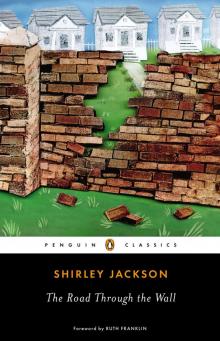 The Road Through the Wall
The Road Through the Wall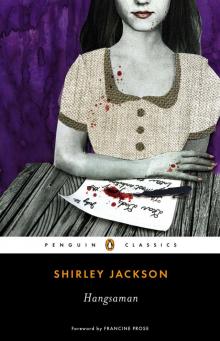 Hangsaman
Hangsaman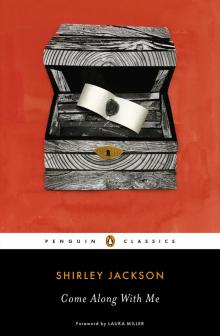 Come Along With Me
Come Along With Me The Lottery
The Lottery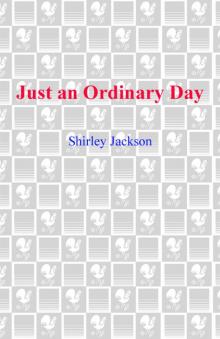 Just an Ordinary Day: Stories
Just an Ordinary Day: Stories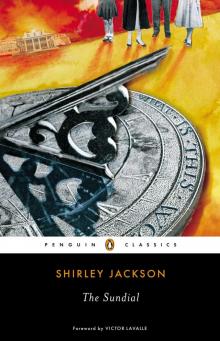 The Sundial
The Sundial Dark Tales
Dark Tales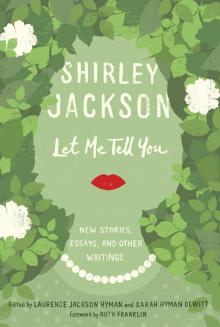 Let Me Tell You: New Stories, Essays, and Other Writings
Let Me Tell You: New Stories, Essays, and Other Writings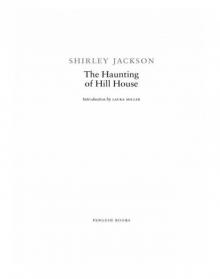 The Haunting of Hill House
The Haunting of Hill House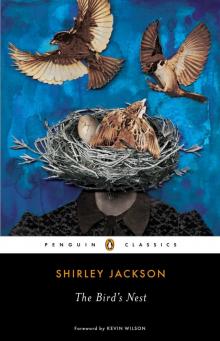 The Bird's Nest
The Bird's Nest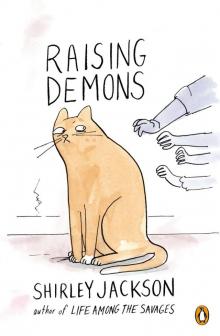 Raising Demons
Raising Demons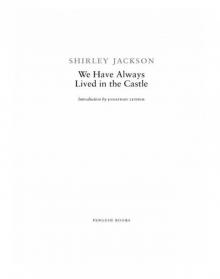 We Have Always Lived in the Castle
We Have Always Lived in the Castle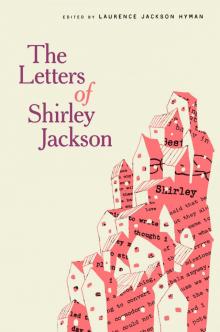 The Letters of Shirley Jackson
The Letters of Shirley Jackson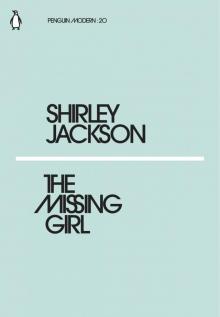 The Missing Girl
The Missing Girl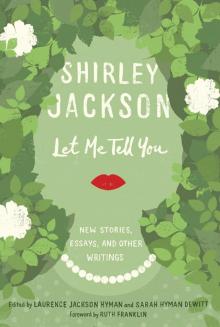 Let Me Tell You
Let Me Tell You